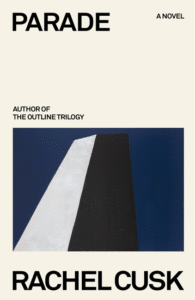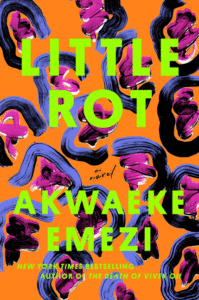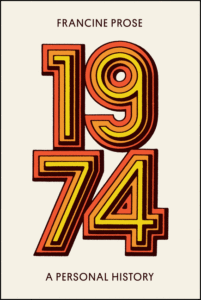
5 Book Reviews You Need to Read This Week
"We come away troubled, unsettled—and in some subtle way changed."
Our basket of brilliant reviews this week includes Nicholas Dames on Rachel Cusk’s Parade, Chelsea Leu on Akwaeke Emezi’s Little Rot, Sasha Archibald on Francine Prose’s 1974, Ron Charles on Julia Phillips’ Bear, and Chris Power on María Bastarós’ Hungry for What.
Brought to you by Book Marks, Lit Hub’s home for book reviews.
*
“After reading Parade, you might be tempted to imagine the history of the novel as a cyclical battle between accumulation and erasure, or hoarders and cleaners. For the hoarders, the ethos is to capture as much life as possible: objects, atmospheres, ideologies, social types and conventions, the habits and habitudes of selves. For the cleaners, all of that detail leaves us no space to move or breathe. The hoarder novel may preserve, but the cleaner novel liberates. And that labor of cleaning, of revealing the bare surfaces under the accumulated clutter of our lives and opening up space for creation and nourishment, is women’s work. Or so Cusk’s allegory invites us to feel … This is Cusk’s negative theology of the self, a desire to imagine lives perfectly unconditioned and undetermined, no longer shaped by history, culture, or even psychological continuity … What Cusk has relinquished, as if in a kind of penance, is her curiosity. Even at its most austere, her previous work displayed a fascination with the experience of encountering others … Too pallid … The problem is not that Cusk has trouble finding a language adequate to her theory of the burdens of identity—the problem may be instead that she has found that language, and it is clean indeed, scoured so free of attachments as to become translucent. Parade wants to replace the usual enticements of fiction—people and the story of their destinies—with the illumination of pure possibility. As such, the novel seems designed to provoke demands that it won’t satisfy.”
–Nicholas Dames on Rachel Cusk’s Parade (The Atlantic)
“There’s an art to depicting things going seriously wrong very quickly, and Akwaeke Emezi’s latest novel, Little Rot, is a masterwork of the form. The story takes place over the course of roughly 28 hours, during which a man flees an assassination attempt, another has a knife plunged into his kidney, and yet another is strangled to death while having sex. Astonishingly, none of these events feel gratuitous. Instead, they’re conveyed with an inexorable precision, even an elegance; the reader feels like an unwilling witness to the world’s dark truths. The effect is mesmerizing … The subject matter does not make for easy reading. Hovering nightmarishly throughout the book are pasts warped by traumatic sexual abuse … What gives Little Rot its vitality are its overlapping love stories, its characters’ longing, their acts of devotion and tenderness in defiance of a world in which a soft heart is a liability. But any sweetness is snatched from the darkness, and the love the characters bear for one other becomes impossible or is eventually compromised, curdled by the rot … There are no redemptive happy endings here. If Aima’s story loses its urgency by the end…it’s a testament to how complete a sense of contamination Emezi creates in the rest of the novel, particularly in the stomach-turning and dramatically perfect final twist that drags even the reader into complicity. We come away troubled, unsettled—and in some subtle way changed.”
–Chelsea Leu on Akwaeke Emezi’s Little Rot (The New York Times Book Review)
“Prose’s attention is Russo’s succor, and he lolls in her goodly feminine receptivity like a dog in mud. As part of the package, she ignores his less-than-heroic qualities. He’s a terrible listener, for instance, and an old-fashioned chauvinist. His courage is hopelessly muddled with ego. He lives in squalor, and likes to eat gluey forkfuls of breakfast sausage crumbled over diner blueberry pie—a meal Prose finds so memorably disgusting that she mentions it a dozen times … Prose’s crush is obviously not on Russo, but on the unassailable moral correctness he represents. It’s an odd preoccupation for an author with a career-long interest in transformation. Writers as cerebral as Prose aren’t usually willing to do jazz hands, but she plays the spitballing Scheherazade princess with aplomb. Her plots can be raggedly cartoonish, her cadence twitchy and over-caffeinated, her characters’ inner dialogue unrelentingly neurotic and labile—and somehow it mostly works. You close the book, and what lingers is the frictional plentitude, the radiant funk, of changing and being changed by other people. Perhaps the problem with 1974 is that it’s stuck in 1974. My sympathy warms to a diffident woman writer in her twenties, but now that woman is all grown up. Why does Prose cede her personal history to an ex-boyfriend? … Maybe Prose intuited that she belonged in the driver’s seat, not sitting shotgun to a dried-up activist in the throes of a nervous breakdown. Russo lost a helpmeet, and literature gained a grande dame. No need to rue the ending.”
–Sasha Archibald on Francine Prose’s 1974: A Personal History (4Columns)
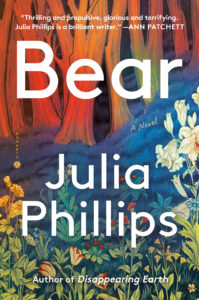
“…what those hundreds of pounds of muscle and fur might mean is challenging to see through the dark woods of this intense novel, which begins with an epigraph from the Brothers Grimm. For almost 300 pages, Phillips wends along the vague barrier that separates pasture from forest, reason from madness … Bear may remind readers of Alice Hoffman’s fantasy-flecked novels, and Phillips sprinkles around the fairy dust liberally in some sections. But she’s actually working closer to the realm of Henry James’s Turn of the Screw, in which the central character blankets the story with her distorting anxieties … It’s likely that every reader will project something different onto this hairy, polymorphic symbol, but perhaps Phillips’s sly novel captures the cumulative stress of long-term nursing, the kind of crazy-making environment that develops when dreading a loved one’s death even while pining for release from the prison of care … All this is spun with an ever-tightening weave of dread. Wisely, Phillips keeps her book relatively short and uses the story’s narrow focus to emphasize the sisters’ physical isolation. Even the novel’s young-adult tone, which feels cloying at first, soon reveals itself as wholly intentional, a reflection of Sam’s arrested development exacerbated by those two years of covid stasis. Impoverished, alienated and desperately lonely, she’s retreated further than she realizes into a world of fragile hope. When that shatters, as it must, the situation becomes more erratic and dangerous than you know what.”
–Ron Charles on Julia Phillips’ Bear (The Washington Post)
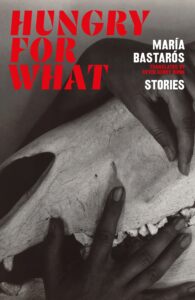
“María Bastarós likes to bring her short stories to a moment of crisis then leave them hanging in mid-air: a shotgun-wielding husband confronts his wife and her lover; a father discovers his twin teenage daughters having sex with his boss; an encounter between a girl and a gang of boys teeters on the edge of assault. These are endings that might, in other hands, leave a reader feeling cheated and wanting three more pages, but Bastarós is so good, her stories so darkly compelling, that personal predilections evaporate in the heat of her talent. Bastarós has published four books in Spain, but this is her first appearance in English (translated by Kevin Gerry Dunn). Set mostly in the lonely, arid landscapes of northern Spain, where the desert ‘plays games that no one understands,’ and swallows the careless whole, the presiding mood of these tales is dread. Bastarós’s characters—jilted lovers, seekers of revenge, daughters plotting against mothers, disaffected office workers—are all waiting for the axe to descend. Almost invariably, it does. It is a moral universe, I suppose, but one that operates according to an ominously occluded—or perhaps just cruel —logic … Some of these stories…read as though the boozy, violent and desperate characters from a Fernanda Melchor novel have relocated to Spain. Bastarós’s writing has a similar muscularity, and an ability to present domestic squalor that makes it, like the stench of the van that delivers the protagonist to her job at a slaughterhouse, ‘take solid form and slide into her throat like a wad of gum, a tangible thing she could chew and spit in someone’s face.’ The more time I spent in Bastarós’s world—and it is a world, geographically demarcated and with characters migrating from one story to another—the more I was reminded of the Argentinian writer Silvina Ocampo, who composed an impressive library of macabre work between the 1930s and 1980s. The malignity Bastarós’s stories exude, as well as their use of child protagonists, perversion of domestic settings, the sensation of sliding between reality and weirder, less explicable spaces, and, relatedly, the unpredictability of where the next sentence will lead, are all traits these writers share.”
–Chris Power on María Bastarós’ Hungry for What (The Guardian)
Book Marks
Visit Book Marks, Lit Hub's home for book reviews, at https://bookmarks.reviews/ or on social media at @bookmarksreads.










